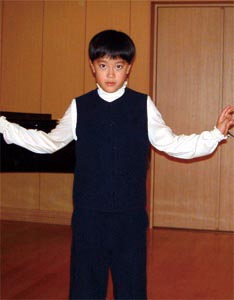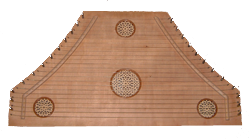- Welcome to the page of Kotohisa Ueno CD -.
(I'm sorry. My English language skill might not be transmitted on this page it is insufficient but well. Please understand imagining it well. )
It wants to be soaked in child's singing voice in the gentleness of one and the ancient music machine that wants to be healed.
It is open Cata as for the door in the world that has not been known yet. We will recommend it by all means.
It plays in Kotohisa Ueno and the voice. Play of Kotohisa's voice. Payment method There are another and a method. It is a method of assumption as the resistered mail of usually sending Airlines by service (airmail). It is Japanese yen, a US dollar, and Euro that is received. The amount of payment is as follows.
|
Performance of voice freely transformed only as no marvelous high tone boy soprano. |
Vokal:Kotohisa Ueno / Early musie playing, music arrangemt:Tessey Ueno / |
|
| It is possible to listen to the mp3 demonstration by clicking the title with ๔. |
End of the boyhood Now my son Kotohisa has just turned 13. Once he mockingly imitated the ways his vocalist mother sang during her practice without any difficulty in his chirping voice, but his voice has changed and the amazingly high-tone could never be heard as before. It is said that the best moment of a boy's 'treble' comes from just before the breaking of his voice. In the past, to save this particular voice people created a drastic measure called castratos ; now fortunately we have a more sophisticated way of recording the boy's voice on a CD, so I collected my son's various takes onto my Mac. I like the Beatles so Kotohisa also loved singing their numbers since his early boyhood, in his double-talking English, and he played by ear nearly all of them in every detail. He practised the piano from 8 to 10, and that was almost all of his musical career. He was born as a son of professional musicians though we have never imposed any vocal lessons on him nor forced him to join a choir, unless when he showed his own will to do so himself, so his voice has been barely trained in proper ways. Nevertheless he has a sharp sense of notes and he has even developed needless absolute pitch without noticing(personally I think a musician has to develop his good ear for music but there is no need for 'absolute pitch'), while we have received comments like 'nurture passes nature' so he might be called 'a wild boy in music' if you like. We noticed his high-pitched voice though, any idea of putting him into musical training never came to mind until a vocal tutor of my wife, Mrs Hideko KUWAHARA encouraged him to take her lessons with his mother, and then the two of them duetted FaureL's Pie Jesu. After their duet, Kotohisa received the tutor's applause, so it led him to singing of some works composed for boy soprano. I am currently one of the main members of The Catherina Early Music Consort and Roba(meaning 'donkey' in Japanese) Music Theatre, both groups formed of performers of early music ; also as a composer and arranger, I have almost all the recording equipment including devices for mastering a CD in our home(I am an avid recorder all by myself). Thus it naturally led to a notion how I could make this subject, Kotohisa the wild boy in music, into a fascinating cuisine ; this is a major point in this recording. I take this album as a precious record of the last sparks in a boy's voice, so I brought out not only his high-pitched voice but also tried to search out every potential for expressions of his voice as far as possible. As an early instrumentalist I used a wide range of the early, ancient instruments in this CD but especially I wanted to create freely an album not confined to any genre or label, so I added a kind of a collage out of his spontaneous ad-lib voices. Kotohisa seemed tired after the recording session, and he said he would not want to sing for a while. Anyway to me this is my first and last recording by a boy soprano. If I recorded his voice again, then his voice would be a grown-up, adult one ; there would be no more Kotohisa the boy soprano but a different man. Now that my son is about to catch up with my height and be taller than I, you can not find any trace of that boy frozen in this CD. The album shows you some of musical and real snapshots of Kotohisa during his years 10 to 12 and a half, his boyhood that would never come back again. Notes on the tracks Trying to explain the tracks of each piece in this recording is superfluous; because what you feel as you listen to this album is enough. Nevertheless, I want to convey something more about the tracks. For example, the high-frequency notes you can hear throughout this album are all from Kotohisa's own voice, in case you should mistake them for some instrumental notes or electronic sound effects! 'Like the bird' was a revised piece which was originally composed as the theme song for a children's drama course musical Dvenadtsati Meshatsef produced by The Rakurin Company. In the last part of the song you can hear various seabird-like mews, all of which are from my son Kotohisa's voice. He would entertain us by mimicking some birds' singing or the chirpings of cicadas. 'Kirara(blinking)' was originally a song dedicated to the Palestinian kids but I have given up writing the lyrics so in the end its 'echoes of hope' remain. Mr 'Garyu' from the Roba Music Theatre joined in this song with his panpipes (my favourite instrument!), the sound of which was intertwined with my psaltery or santur extemporaneously. 'Dance of star' was originally composed for 'Town Where Dreams Soar', a civic musical of Imaichi, a local city in Japan and now a part of the City of Nikko, where I was invited as its composer by my friend Ms Mari Kataoka. When the producer and adapter Mr Hirosi Eto first heard Kotohisa's demonstration tape, he asked me if he might use his voice in the dance sequence inspired by the image of a constellation because he sang pretty well. Andrew Lloyd Webber's 'Pie Jesu', as I mentioned before, is Kotohisa's debut song as a boy soprano. In November 2002, he and his mother sang this song publicly for the first time, at a concert given by the pupils of Ms Hideko Kuwahara, where he received high appreciation. I was glad to find such a potential within my son's ability, and soon I recorded it with an orchestral accompaniment. Then I asked some friends of mine to hear my first take. While making the album it was taking on more originality, and I realised it was a too run-of-the-mill version for such a well-known piece so I decided to replace the accompaniment track with the more original one, using the lute. 'Kurin-korin ?` tona-dona' is the theme song for 'Tona-Dona's Concert' given by the Roba Musical Theatre. I spread Kotohisa's vocal playing as much as I possibly could; its image is a song sung by a visiting E.T., who explores the Planet Earth. On 'Twin star', its original author is Kenji Miyazawa, the well-known Japanese novelist and farmer : he also wrote the lyric 'the song touring around the stars' himself but here I prepared my own, to inject a different imagination into it. The whistler is Mr Garyu, not being mentioned. In 'The sunset today', mixing the notes of my lute with those from my psaltery, I wanted to express a unique, crude sentiment of a boy when he is looking at the beautiful sunset but never feeling moved too much by it. I personally could not think 'Ave Maria' was composed in the typical style of the Italian composer from the early 17th century, Giulio Caccini. This is many boy sopranos' and countertenors' favourite with the softer accompanying sound of the organ, but here I changed its arrangement to a kind of 'The Catherina Early Music Consort' style, even using drum sounds. 'Try-like' was composed when I was 25, far back from those old days! Remembering it, I don't think I will ever write a similar poem again right now. 'Country of star' is among the repertoire of the Roba, which is frequently performed by panpipes, and once I had it recorded being sung by my wife Ritsuko. 'No no hana' is one of the well-known poems from A song play on words by Mr Shuntaro Tanikawa, one of the Japanese most renowned poets, with whom I often performed on the Roba's platform. Here I put some ad-lib phrases together into a small piece, imagining a carpet of countless rape blossoms. In 'Whisper of spring', I played my keyboard and rolled out phrases in an impromptu basis, which Kotohisa emulated, and then I broke up and re-ordered them, adding my improvisation by santur following the notes by ear, in just one take. In 'I am the Walrus', Kotohisa's pronunciation was so dubious I must say, to the extent of sounding like a 'make-believe' play. I didn't change the original arrangement by the Beatles though. I wanted to put this song into the album because this is the piece which reflects Kotohisa's own individual will the best. Throughout the piece, he designated how many times which register should be superimposed on another ; I was impressed with his good memory at the point. In the last part, you hear the gradually rising notes, which are from Kotohisa's own voice of course, not electronic-generated ones. In 'To outskirts of the star' I played spontaneous chords from my keyboard and as Kotohisa heard them, he sang the appropriate notes into them a single beat later. I recorded the improvisation as it was and then rearranged a part of it in the way of adjusting the one-beat-later vocals into the initial notes in the proper beat. This was the last piece recorded of Kotohisa's soprano voice, which tells us his farewell to the period of his boyhood, now far back in our memory ---- as if looking up at the old lights of the stars for hundreds of light years ... ---translated by Fugue. Tessey Ueno |
| - Link *
|
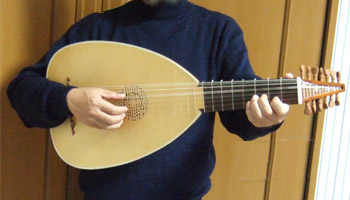
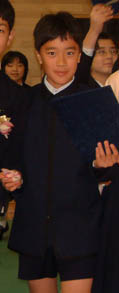
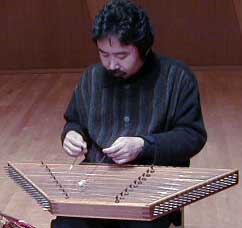
lute santur
Number of visitors
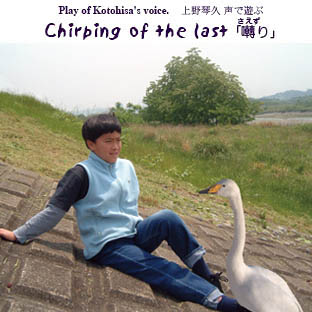 MAGI RECORDER MAG-001
MAGI RECORDER MAG-001